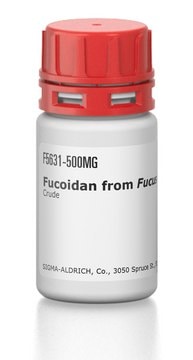Recommended Products
biological source
algae (Undaria pinnatifida)
Quality Level
Assay
≥95%
form
powder
color
white to off-white
useful pH range
3.0 -7.0
solubility
water: 10 mg/mL, clear to slightly hazy, colorless to faintly yellow
storage temp.
room temp
General description
Fucoidan has a complex chemical composition. It contains mannose, galactose, glucose, xylose and other monosaccharides. It is also composed of uronic acids, acetyl groups and protein.
Fucoidan is a fucose-rich, sulfated polysaccharide isolated from several species of brown seaweed.
Application
Fucoidan from Undaria pinnatifida has been used to assess its antimicrobial potential in vitro.
Biochem/physiol Actions
Studies of fucoidan have found it to have a broad variety of biological activities including antitumor and antiangogenic activities, immunomodulatory, anti-inflammatory, anticoagulant, antithrombotic, and antioxidant activities. Fucoidan induces macrophage activation which subsequently activates mitogen activated protein kinases (MAPKs) and results in natural killer cell proliferation. Fucoidan acts as a nonselective selectin blocker and has been shown to induce apoptosis and suppress angiogenesis.
Other Notes
To gain a comprehensive understanding of our extensive range of Polysaccharides for your research, we encourage you to visit our Carbohydrates Category page.
Storage Class Code
11 - Combustible Solids
WGK
WGK 3
Flash Point(F)
Not applicable
Flash Point(C)
Not applicable
Certificates of Analysis (COA)
Search for Certificates of Analysis (COA) by entering the products Lot/Batch Number. Lot and Batch Numbers can be found on a product’s label following the words ‘Lot’ or ‘Batch’.
Already Own This Product?
Find documentation for the products that you have recently purchased in the Document Library.
Customers Also Viewed
Fucoidan: structure and bioactivity
Li B, et al.
Molecules (Basel), 13(8), 1671-1695 (2008)
Arumugam Ponnan et al.
Environmental science and pollution research international, 27(25), 31760-31766 (2020-06-07)
Fucoidan is a unique bioactive and dietary polymer enriched mainly in the cell wall matrix of the brown seaweeds. This present study was intended to reveal the antigenotoxicity effect of fucoidan on 4-nitroquinolin-1-oxide (4-NQO) induced genetics damage and apoptosis in
Xiang Li et al.
Arteriosclerosis, thrombosis, and vascular biology, 34(8), 1661-1667 (2014-06-07)
Nuclear imaging of active plaques still remains challenging. Advanced atherosclerotic plaques have a strong expression of P-selectin by the endothelium overlying active atherosclerotic plaques, but not on the endothelium overlying inactive fibrous plaques. We proposed a new approach for noninvasive
Anna Pielesz et al.
The Analyst, 140(13), 4599-4607 (2015-06-02)
Differential scanning calorimetry (DSC) and thermogravimetric (TGA) investigations, acetate electrophoresis (CAE), Fourier-transform infrared spectrometry (FTIR), scanning electron microscopy (SEM) analysis and microbiological procedures were all carried out after heating the samples to a temperature sufficient for simulating a burn incident.
Wentong Cui et al.
Laboratory investigation; a journal of technical methods and pathology, 94(4), 382-393 (2014-03-13)
Endothelial dysfunction, characterized by impairment of endothelial nitric oxide synthase (eNOS) and nitric oxide (NO) bioavailability, has been implicated in diabetic cardiovascular pathogenesis. In this study, low-molecular-weight fucoidan (LMWF), which has multiple biological activities including anti-inflammatory and anti-oxidative properties, was
Our team of scientists has experience in all areas of research including Life Science, Material Science, Chemical Synthesis, Chromatography, Analytical and many others.
Contact Technical Service








